City Council Candidate Brian Pendleton’s Unique Qualifications, Proposals
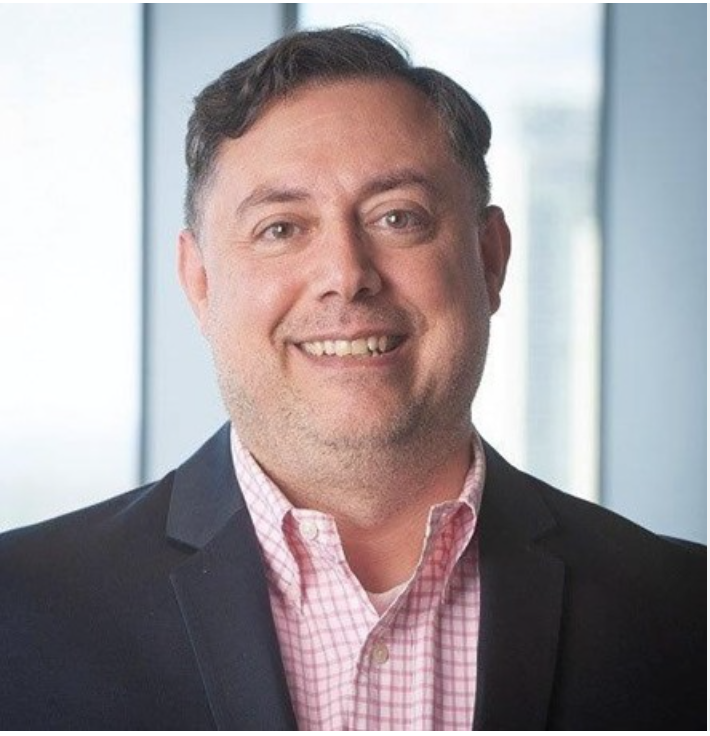
With citywide elections for the Falls Church City Council just days away – Tuesday, Nov. 4 – The Falls Church Independent offered interviews to the three non-incumbent candidates, Brian Pendleton, Arthur Agin, and James Thompson, Jr., running for the four open seats against incumbents, Laura Downs, David Snyder, and MaryBeth Connelly. We’d met each of the non-incumbent candidates at the recent Citizens for a Better City and Falls Church Forward Candidate Forum Oct. 22. As of today, only Pendleton has accepted our offer. So, we’ll share what we’ve learned.
Meet Candidate Pendleton
Who is Pendleton, what qualifications does he have for City Council, and what distinguishes him from the other candidates in the race?
An Arkansas native and former service member – with multiple active tours – in the United States Army and the Arkansas National Guard, Pendleton has lived in the City of Falls Church for fifteen years, but has traveled all over the world.
“I grew up in both Texas and Arkansas. I went to the University of Arkansas. I’ve been part of the U.S. Army, both in the Arkansas National Guard and the U.S. Army Reserve,” Pendleton told us. “I did several active tours as part of both of them. I first came to the D.C. area back in 1997, and left and came back several times. So, I knew that I’ve always been attracted to this area. In 2010, I got a place here in Falls Church, renting, and then in 2011, I actually bought the condo that I live in now, [at] Falls Plaza."
On his candidate website, Pendleton says he decided to settle in Falls Church “after falling in love with the city,” because it reminds me "of a college town.” Before moving to The Little City, he “lived in Arkansas, D.C., New Jersey, Texas and Arlington, Va., as well as Rio de Janeiro and Sao Paulo, Brazil, and London, England.”
Unique among the candidates, Pendleton has high academic credentials not only in business management, but in Cybersecurity, Information Systems, and Information Security. He holds both a BSBA in Finance and a Master’s in Information Systems from the University of Arkansas. From American University, he earned an MBA. And he holds a Doctor of Science (D.Sc.) degree in Cybersecurity from Marymount University, for which he has also served as a Visiting Professor of IT and Cybersecurity.
“My work career has included a Fortune 5 company, several tech start-ups,” and “several USG contractors,” his candidate website says. “Currently, I'm serving as the President of the Falls Plaza Condominium Association and on the Board of Equalization for Falls Church. I have been an election official with the city since 2016.”
On LinkedIn, Pendleton identifies himself as an “Artificial Intelligence and Security Researcher.” In a guest speaker description from a Cyber Security Conference at opcde.com, Pendleton’s work background is described as follows: “Before working at Marymount University, Brian amassed over 25 years of business experience in companies such as Wal-Mart, ITXC Corp., Fairfax Water and others in various technical and management positions. He served in the United States Army Reserve in Psychological Operations and Intelligence.”
Pendleton is also a partner at Tasaane Mgmt. LLC, a management company pursuing AI Security and IT Security contracts, and a Minority Woman Veteran-Owned Small Business. Tasaane means “tadpole” in Apache, a homage to Pendleton’s Native American ancestry through his maternal grandmother.
Mission and Service
We asked Pendleton how his military service might lend to his qualifications for City Council.
“I would say this about most military people, that it speaks to a sense of mission," he said. "There’s always an end goal we’re trying to reach. And one of the things in the military, as you know…. we must accomplish our mission, right?.... And the other thing I think it really talks to is about service. When you go for an elected office, that’s one type of service. But, I honestly believe anyone going into the military, or looking to be in the police force, or emergency responders, nurses, doctors, anything like that, it is a whole different level of service where you’re saying, ‘I’m not here for any popularity contest,” or even because I’m mad at City Hall or anything like that. It’s just that ‘I want to serve.’ So I think that should be a huge factor in people’s minds that these types of people want to serve and be of service.”
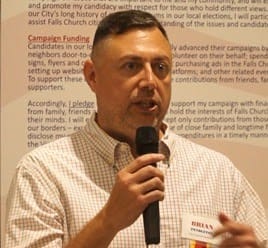
Unique Family Perspective
Pendleton told the Candidate Forum and us he’s not married and has no kids, but “that’s one thing that kind of sets me apart from every other candidates.” Though he’s a great supporter of the City’s top-notch school system, he’s perhaps better able to appreciate the City’s non-school system priorities. “Not having kids, I think, does give me a chance, at least, to look at things a bit more critically.”
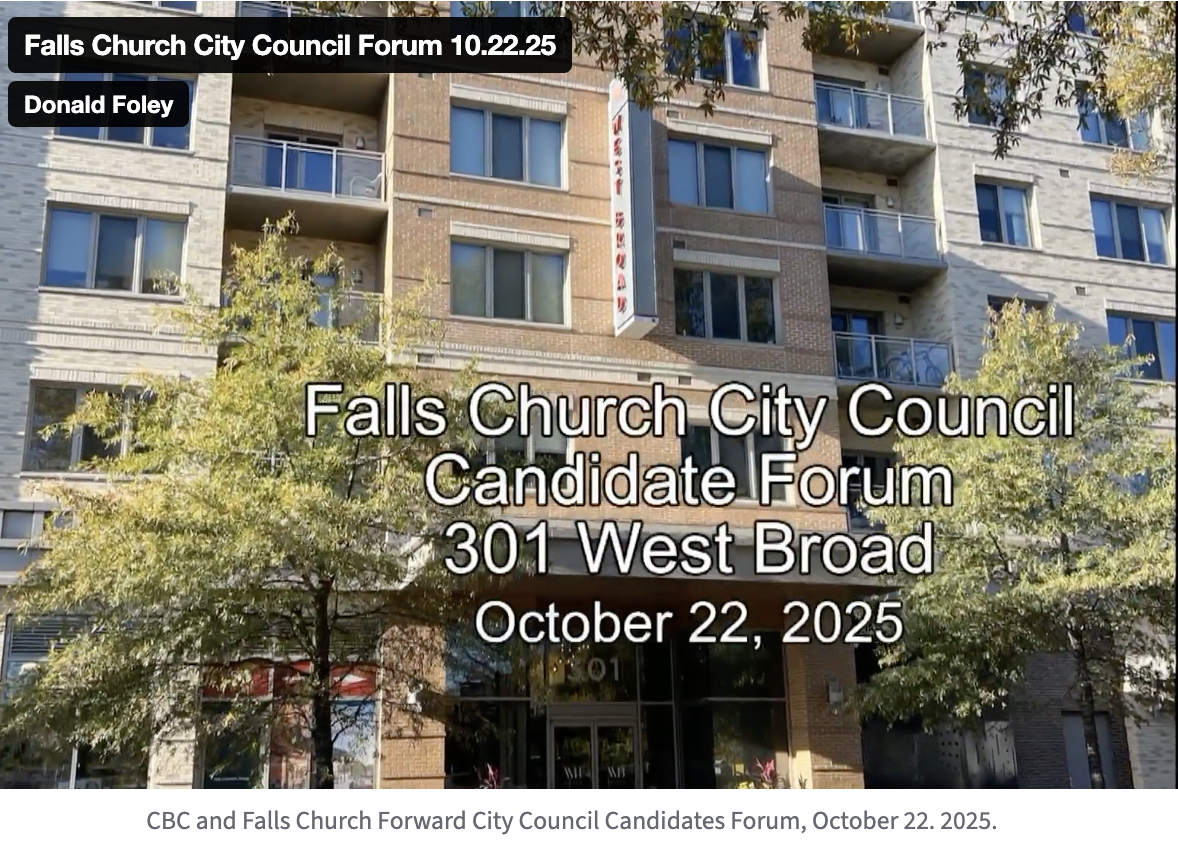
Modernizing City Hall
We asked Pendleton about his highest priorities should he be elected to City Council. Without hesitation, he said, “I want to modernize City Hall. We haven’t kept up with the times. ”
Two frustrating sets of experiences inform Pendleton’s concerns. Just trying to file the paperwork and manage the red tape around getting a permit for his own home office, and the cumbersome inefficiencies of guiding Falls Plaza through a $1.5 million reconstruction project, has meant he’s “had to deal with the Permitting and Planning Office quite a bit.”
So what does Pendleton mean by “modernizing City Hall”? “The system they use as an ERP – an Enterprise Resource Planning tool – is called Munis, and it is old,” he said. And he has experience with ERP implementation because he did it as a contractor for the whole state of Arkansas and most recently for Moderna.
Falls Church City’s current ERP was designed about 25 or 30 years ago,” Pendleton said. “It’s been having updates, but you can’t just keep updating a tool. Eventually, you need a new tool…. So, we need a whole new ERP system, one that’s built from the ground up, for smaller governments. And those do exist out there.”
“And Munis was originally purely a financial program that has slowly tacked on new modules for inventory, trouble-lead tickets, and all this other stuff that it wasn’t really designed for,” Pendleton continued. “Right now, for instance, if I want to get a home office, I have to go to the Commissioner of Revenue, and before they give me my ‘Okay’ to have my home office, I have to go to the Permitting Office and fill out a form, and then I take that form in paper, back to the Commissioner’s Office to show them that I went and got the permit, and then they say, ‘Okay, you’re now a registered home office.’”
“And the Commissioner of Revenue and our Treasurer, their system doesn’t quite talk together as it should. And you’d think that at least those two functions should work well together, right?,” he said. “So, from a technology perspective, we are behind the times, for a city that I think sees itself as a modern city.”
But, it’s not just about efficiencies, Pendleton said. New tools also incorporate the latest “best practices” for small governments.
Balancing City Funding with School System Funding
With his finance and business backgrounds, Pendleton emphasizes the importance of needs-based budgeting and finding a proper balance between the City’s non-school needs and those of the City’s school system.
He wants to ensure City budgets avoid tax increases on residents. You’ve got to differentiate between the pressing “needs” and the deferrable “wants” in every budget proposal.
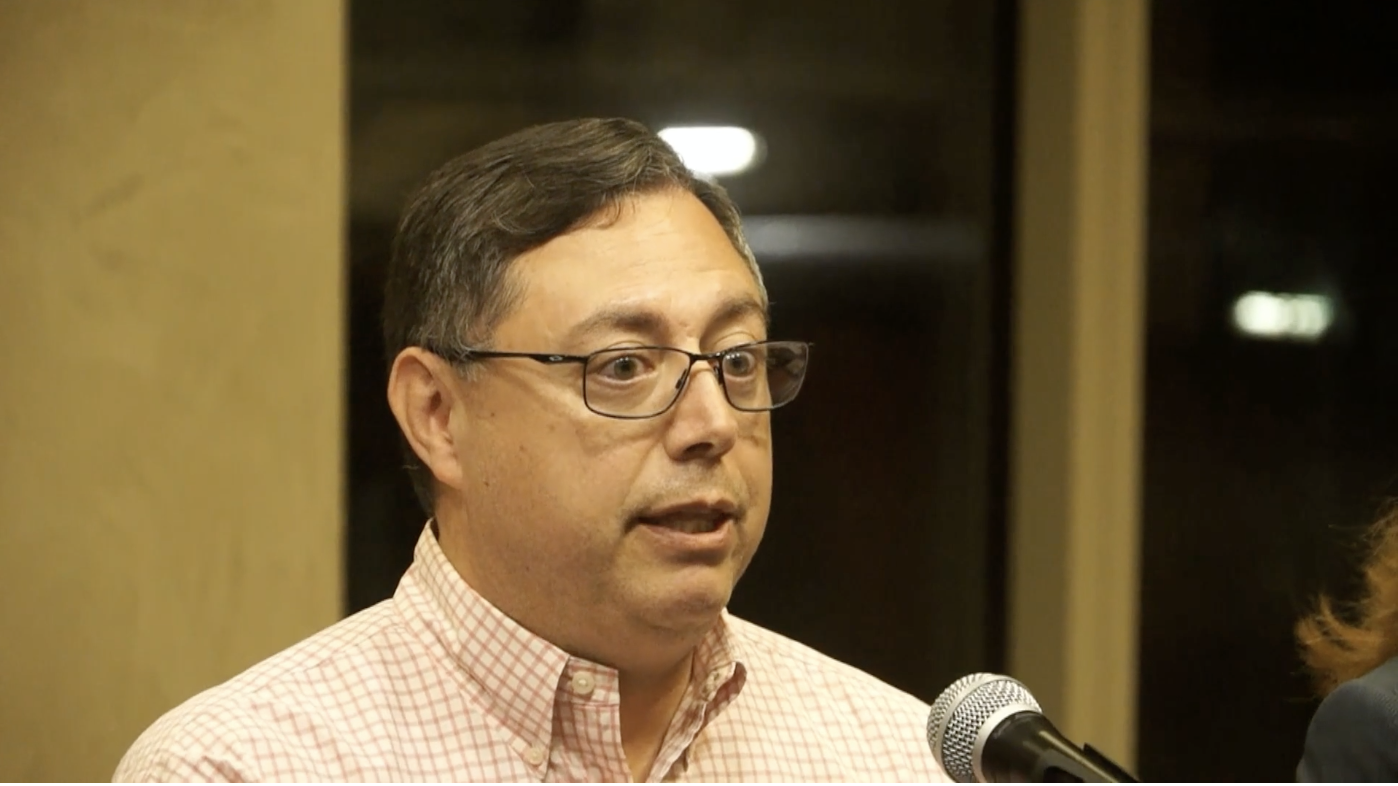
“I look at everything through a business lens, since I’ve been in a business background,” he told us. “But, whenever you create a budget, you identify your needs first and then you ask, ‘Okay, what do we have left over? What are we going to be able to do?,’ and, ‘Who should get funding past their needs?’”
But Pendleton stresses he’s calling for a “balance” of priorities, rather than simply for slashing critical educational needs such as staff and teacher salaries, lunch programs, special education, or music and art instruction. “I myself was a special education student for nine years, so I firmly believe in funding special education needs…. And, I don’t think that I would have gone this far as I have without having experienced music and art education in my schools,” he said.
On Diversity and Environmental Protections
We noted that at the most recent City Council Candidate Forum, Pendleton was the only candidate to mention the seeming lack of diversity in the community meeting room at 301 W. Broad St. at the time. He also referred to his own Apache and Mexican backgrounds.
So, we asked if wished to elaborate on how his own diverse background might contribute to his views on the importance of diversity in City policy considerations.
“I will say, I am very proud of being Apache, but I don’t think it’s right to use it for political purposes or anything, because I never grew up on a reservation or anything like that,” Pendleton said. And he emphasized how different Native American tribes have every reason to be sensitive about claims of affiliation.
“On my mother’s side of the family, her mother was full blood Chiricahua-Apache and her father was Mexican,” Pendleton said. “Now I always put a little asterisk by that because we believe that his parents had moved from Spain, then he immediately left and came to the U.S. My mom was the only one of my aunts and uncles who were born here in the U.S. All my other aunts and uncles [on that side] had been born in Mexico. So that’s where the background comes from.”
“But I will say, like I said in the forum, it does give me a perspective about nature and, between growing up on a 25-acre farm and working on that with my grandfather on my dad’s side – but he was very much a farmer who very much believed in farming the land – and then, how I feel about, not just Apaches but just about the many different tribes’ views on nature, I definitely have a viewpoint that we need to do more. There are a lot of things we pay lip service to, but we need to be really focused on protecting not just our trees, but expanding that out.”
“And what of the City’s diversity now?,” we asked. For Pendleton, because the City has become more and more expensive to move into, it has naturally become less diverse.
“I’ve often said there isn’t diversity,” Pendleton said. “We say we’re open and inclusive. But look at the people that live here…. And that isn’t to shake your finger at anyone…. It’s just hard to move into Falls Church. And if you take a look – and I’m going to take a look at the Latino side that I kind of get passionate about – you go to every restaurant and…. you’re going to find Latinos working there. But, where are they living in the City? They’re not. So you have a certain group out being served and you’ve got a different group that can’t afford to live in the City working in all the different places. So I do think we have the opportunity to expand the [notion of] ‘inclusive and diverse.’”
So, what might alleviate this lack of Latino diversity in the City? “At the forum, I had mentioned that whenever we allow a developer to build townhomes, maybe the City buys one and makes sure that it goes to an underrepresented community,” Pendleton said. Perhaps a lottery could be held by the City for the dwelling, he suggested, with a covenant that the new owners would only sell to people who will live in the homes, and not to outside developers.

Pendleton is also concerned that different metrics are used to account for “middle-class” residents, when they’re of different races and ethnicities. “People may say, ‘Well, middle-class means they have the same resources.’ But, no – it doesn’t.” There’s a clear difference between the economic leverage of “middle-class Latinos” versus “middle-class Whites” in today’s local economy.
Asked what he thinks of how the City includes the Vietnamese community at the Eden Center, Pendleton described growing up near large Vietnamese refugee communities in northeast Arkansas that formed after the Vietnam War. “After the Fall of Saigon, many, many Vietnamese families were relocated and they lived on Fort Chaffee for a long time. So, northwest Arkansas actually has a very diverse Vietnamese population because from Fort Chaffee they started moving into Fort Smith and then they just started moving into the upper northwest part of the state. So, I am very familiar with the Vietnamese people and I love that there’s this community right here.”
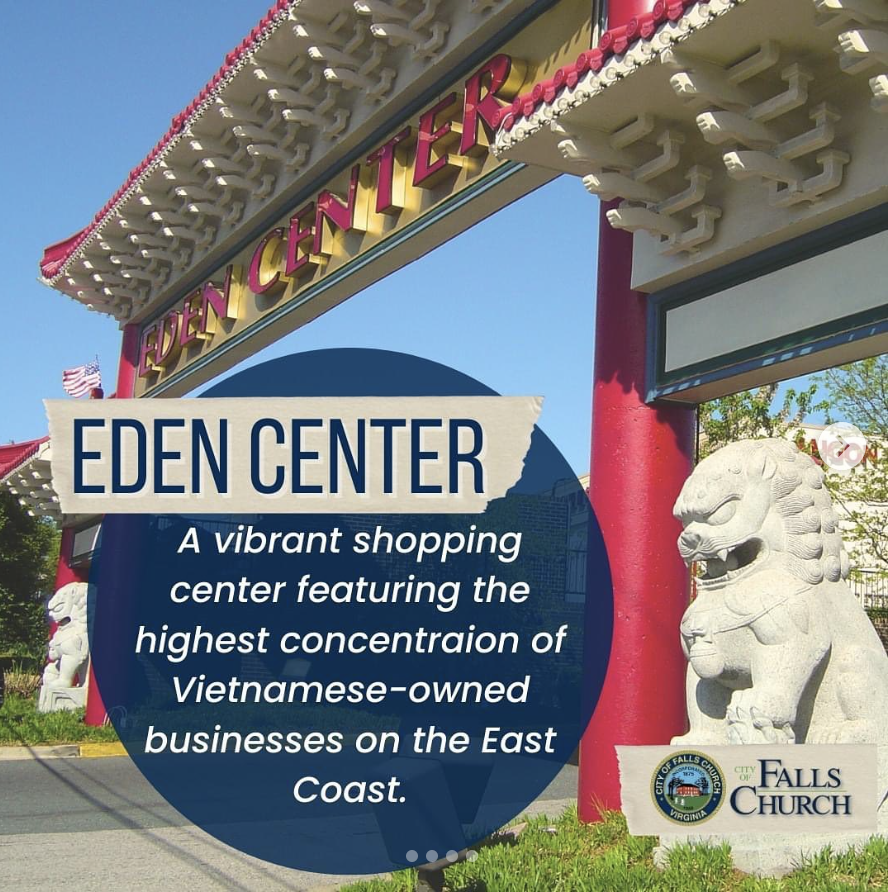
“But, I would also say, again, that we’ve given them the opportunity for businesses, but where’s their opportunity to actually be a part of the community?,” Pendleton asked. “Because without having permanent homes, not just apartments, do they actually feel like they’re a part of the community? Because to me, that should be part of it. How do we make underrepresented groups feel like they’re actually a part of our community and not just that we’re using them for a tax base? Not that I’m saying the Councilors or the City are doing that intentionally, but I’m just saying that’s an issue.”
On Housing
Asked how the City might boost affordable housing units to increase diversity, Pendleton argued the City should use more of its leverage to boost the volume of affordable set-aside units at apartment complexes such as the Alder at West Falls.
While any new housing units must be “worked around trees and green space,” he champions “true mixed-use” developments.
“The next big thing is going to be the Gordon Road Triangle,” Pendleton said of the City’s West End Operations Yard and surrounding businesses and concerns slated for re-development. “When we build that, we need to make sure there is 'true mixed-use' for that. There should be maybe some type of business. It’s been unpopular for me to say that we need offices. But without office space we can’t attract things like larger law firms, larger accounting firms, and larger engineering firms that would then possibly not only contribute to the economic base through business tax, but also to using our restaurants, buying our homes, etc.”
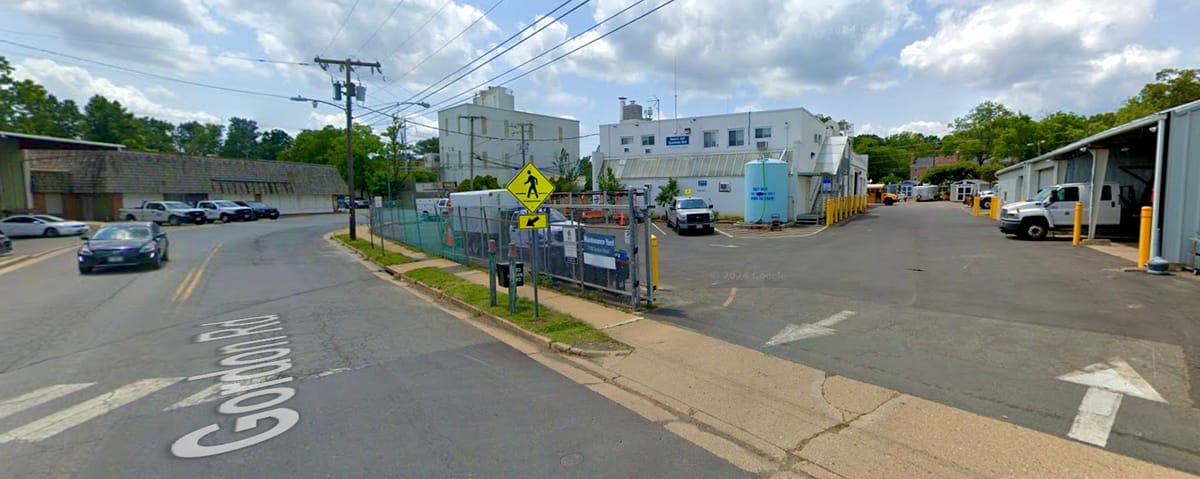
“We should also make sure there are homes there and that some of those are apartments, some of those are condos, and of course it has to work for the space,” Pendleton continued. “I’ve also thrown out the crazy idea of having a small data center buried underneath it as a revenue generating proposition for the City. But if it all worked together, you would think that’s going to be one of the last spaces in which we’re going to be able to create a lot of new living space.”
Pendleton also wants to encourage the City to disincentivize the building of “McMansions” and the “knocking down of old 1950s style homes.” While more McMansions might fuel the tax base, they don’t necessarily increase the number of residents moving into the City and “they just keep tearing down trees [and] they’re taking up that much more grass space.”
“And, forget that word environment – it’s Nature,” Pendleton emphasized, including all the animals as well as the sensitive flora. Of course, Pendleton also embraces tree canopy regulatory protections for single-family homes.
Achievements for the Falls Plaza Condo Association
Interestingly, Pendleton didn’t bring up his Falls Plaza Condo Association presidency – an office he’s held for more than a decade – in his discussion of achievements. So, we probed a bit, and found that it’s arguably one of his highest qualifications for local government.
Falls Plaza along Haycock Rd. is a 72-unit community and a “microcosm of Falls Church” itself, Pendleton said. “We had to deal with issues of the environment, with increased rainstorms, and we identified more and more of the leaks throughout the building we had to deal with. We had to deal with businesses, and owners, because more than half of our units are now owned by investors who are renting them out,” at prices just below what the Alder is charging. “You have to deal with business, you have to deal with trash. And some people don’t want to deal with trash. So you’re having to deal with issues like that. And, you've got to get consensus. Because not everybody sees things the same way.”
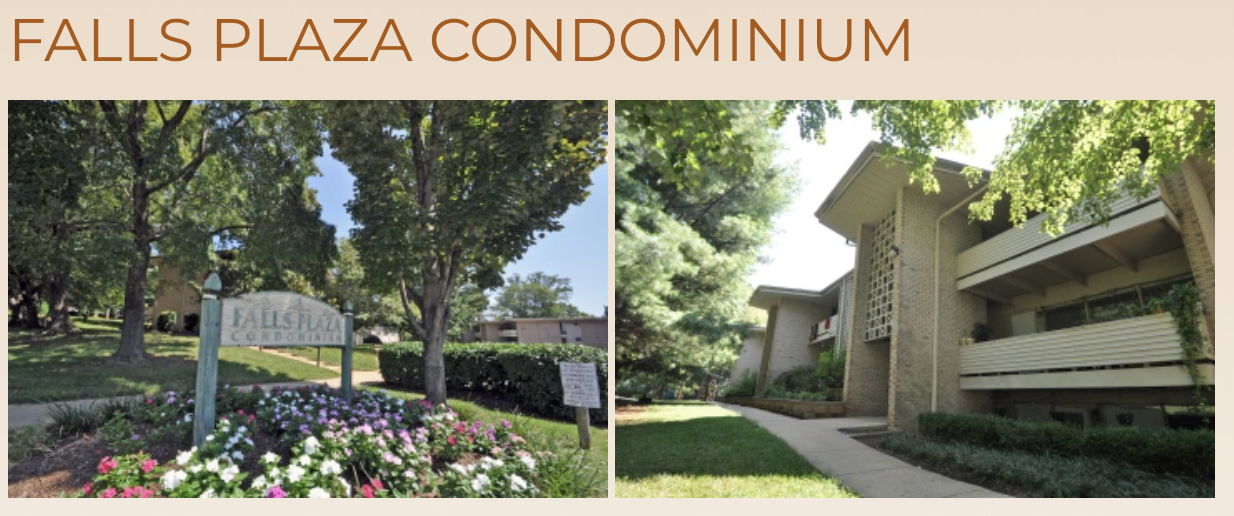
Pendleton described the “nightmare” of having to win over two-thirds of the owners in order simply to amend the condo’s bylaws, as required by the 1974 Virginia Condominium Act, a set of regulations so outdated as to still mandate that all official condo association communications must be snail-mailed rather than emailed to owners.
After being elected President, Pendleton was shocked to learn the association’s capital reserves were much lower than Virginia's legal guidelines. So, not only did he have to convince the Board that the owners’ assessments would have to be doubled the following year, but he had to work with the Board to win over two-thirds of the reluctant and sometimes angry condominium owners.
“And we actually doubled our assessment the next year after I came in…. And, of course, people were up in arms, but at the same time, they understood where we were going and what we were trying to do,” Pendleton said, recalling that many residents tried to have him fired from the presidency and removed from the Board altogether. But, they did not succeed because, “as a group, we convinced enough people to not get us kicked off and for people to actually say, ‘Look, it’s going to hurt, but we understand what they’re trying to do.’”
On Representation
For Pendleton, elected leaders are first and foremost “representatives,” meeting the needs and carrying out the constructive wishes of their constituents. “A lot of people say representatives are leaders. And we are, to a degree, but we always have to remember we are representatives,” he said. And Council members in the City of Falls Church must represent all the City’s residents, since there are no zoned constituencies.
“And there should be no pet projects, even though a pet project for me would kind of be modernizing City Hall,” Pendleton said. “I might have a vision that I’d love to work with staff and other people on, so that it’s not just my vision but it’s actually the City’s vision. But, at a certain point, people might actually say, ‘You know, I don’t think we need this.’ And then I would step back and say, ‘If that’s what everyone thinks then that’s great – let’s move on to something else.’ I can’t just make this about what I want. It’s got to be, ‘What does the City need?’
As voters go to the polls Tuesday, Pendleton would like them to have “an open mind…. to use a little bit of their own own critical thinking skills, and to step beyond any types of endorsements.” He hopes voters will, “actually look and see which candidate fits their vision of the City, and what they'd like to see for the City.”
“I believe I will do my best to represent everybody who comes forward and talks to me and gives me ideas and gives me their opinions,” Pendleton said. “But, at the end of the day, that is also happening with the rest of the Council, so I also need to make sure I can work with the Council. And I believe I can work with anybody to make sure we’re making a better Falls Church.”
By Christopher Jones



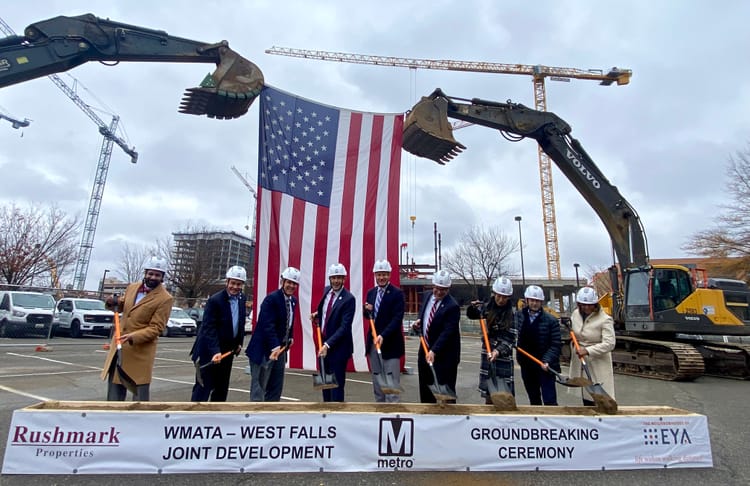

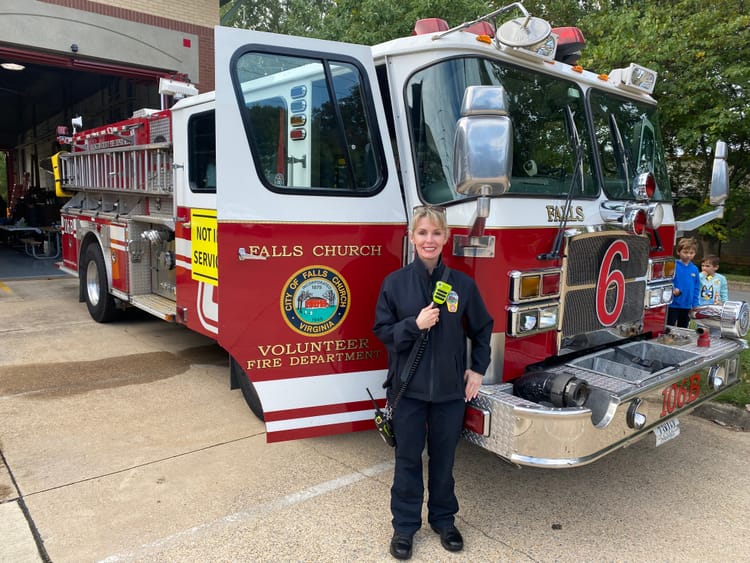
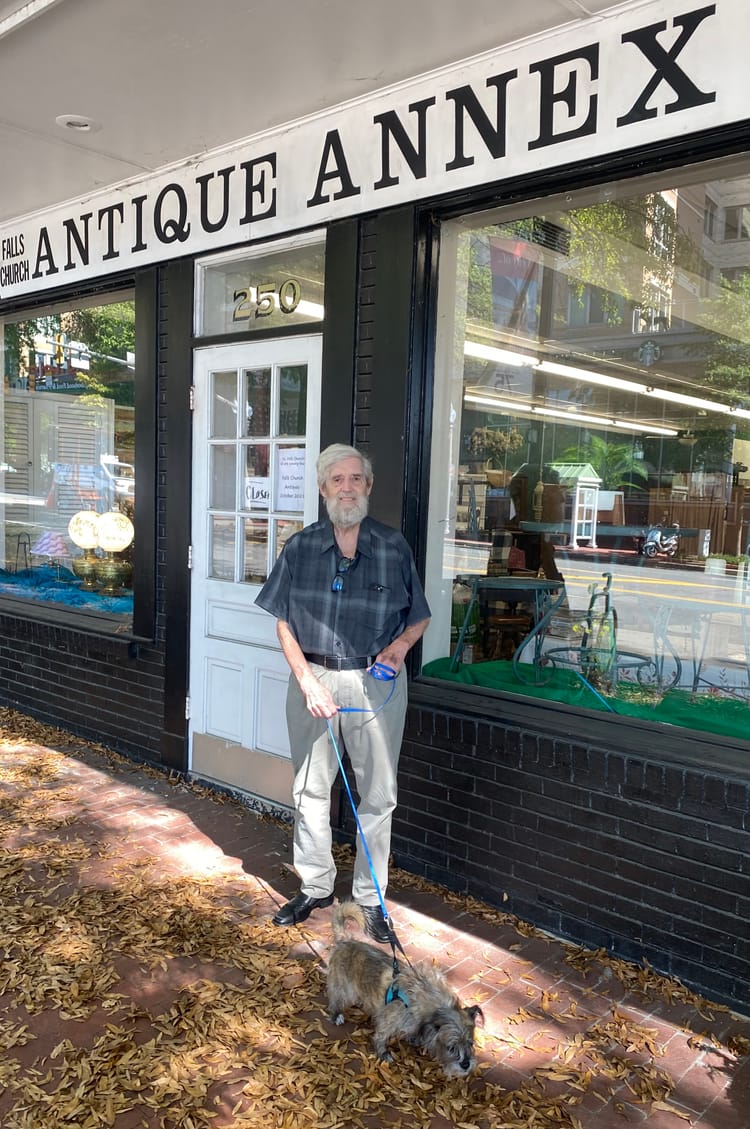
Member discussion